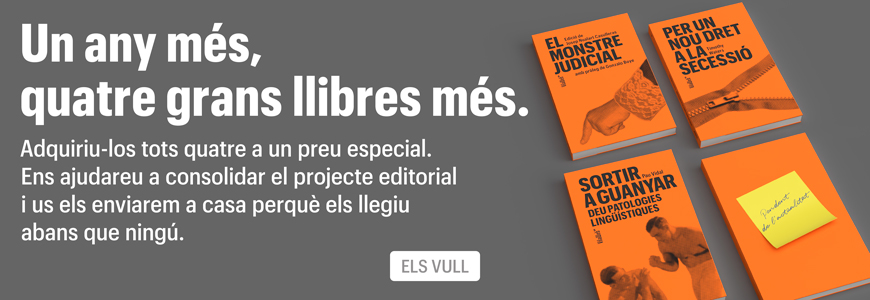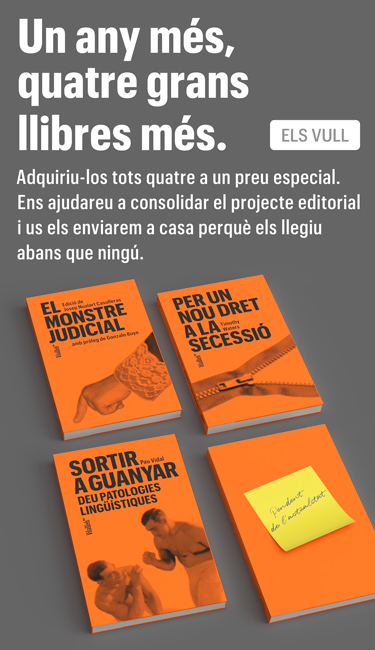20.01.2022 - 10:44
|
Actualització: 20.01.2022 - 11:44
Timothy William Waters is a Professor of Law and a researcher at the Indiana
University Maurer School of Law. He is also Associate Director at the Center for Constitutional Democracy. He recently published Boxing Pandora (Yale University Press), in which he argues that independent states could be more stable and peaceful than the existing borders. His book is a withering critique of supporters of the status quo and its alleged values of pacifism and stability. In addition, Waters argues that it is not necessary to be a nation in order to seek independence, it only requires political will exercised via a referendum. Waters also proposes a method to also defend the rights of those who are forced to join a new state against their will. The following is an interview with Waters via video conference.
—You worked for the International Criminal Tribunal for the former Yugoslavia. Could you tell us about it?
—It was a great experience. I had previously worked in Yugoslavia. I was a lawyer with a team of researchers supporting the investigators and prosecutors. We weren’t investigating the murders but rather the political ties of people like Milošević. I worked with historians and journalists. We focused on the connections between political leaders in Belgrade and the front line of fighting and crime in Kosovo.
—And one day you came across a drunk Englishman.
—Ha! That was a bit before, in Bosnia. Just after the war. I suggested that maybe we could allow people to leave Bosnia. The drunken Englishman shouted at me, “Why don’t you try out your theories in another country?” I found it really ironic. He was right, I was proposing my theories in someone else’s country, not mine. But that’s exactly what he and all the other organizations were doing in Bosnia. They had a theory and they insisted that Bosnia’s unity would be a good thing, without asking people if they wanted it.
—Boxing Pandora. How did you choose the title?
—Many people associate independence with chaos and violence. Opening Pandora’s box is seen as dangerous. I wanted to suggest that maybe it’s the other way around, and that this insistence on keeping the lid on Pandora’s box —and the states as they are— is what causes violence. That opening the box and letting the communities leave peacefully might make things less chaotic and violent. Maybe the problem is that the box is closed. I want to make it clear that the current system, which takes it for granted that borders should not be touched by default, is something we ought to put into question. And that we must also question whether maintaining the current borders stabilises the world, which is what we are told. Maybe it’s not like that. And in the second part of the book I try to outline a better model.
—Here are some statements, or ideas, from your book. Could you comment on them?
—Of course.
—“What if borders are the problem?”
—That’s me. I said that. What if the current borders are the problem? It’s my thesis. I question whether fixed borders are a good idea. And if it’s a stable system.
—“Fixed borders increase stability. But do they?”
—In this book I argue that independence is the solution, not the problem. You can see that communities with different identities are being forced to share the same space and it doesn’t work, there’s no stability. It leads to internal rifts. Take Kosovo, for example. The violence of the 1990s was a result of the rivalry between Serbs and Kosovo Albanians who were forced to coexist in a single state. It’s nice to be able to coexist, but sometimes living in the same unit is what brings conflict and not stability. Who has the upper hand? What language and religion are there in the single state? Separation can solve these issues.
—“Few secessionists achieve independence.”
—Whether you’re in favour of independence or not, it’s a fact.
—“Violent resistance to secession is the problem.”
—We’re told that independence leads to violence, And there’s certainly a correlation between independence and violence. But is it the cause? It’s unclear whether the cause is independence or resistance by the state. Violent resistance to independence is the problem. In the few examples where independence has been by mutual agreement there has been no violence. And the pro-independence activists existed, nonetheless. In Canada, Scotland, Czechoslovakia. In some places it succeeds, in others it doesn’t. But without violence. Compare this to Catalonia, where violence —although less extreme than in other parts of the world— was instigated by the state. It’s the state which resorts to violence with the police wielding batons. And all over the world, the violence we see is better understood if you see it as a response to an otherwise peaceful movement. Kosovo, for example. The pro-independence activists were almost Gandhian in the early 1980s. And they became violent because of the resistance from the state. The state is often the source of violence.
—What are the ideas behind the classical model and how does it differ from Wilson’s?
—They’re my labels. Today’s world, I call the classical model (1945-1970), and Wilson’s, pre-classical. Wilson said, “Let identity and ethnicity draw any borders.” We are now in the classical world, after World War II, in which we say that borders, territories, are fixed. And the people who live there are the ones who have the right to self-government. Them alone. In 1945, this seemed like a revolutionary idea, since that was how decolonisation and independence were justified, but always within the colonial borders. The people who lived there weren’t asked if they shared a desire to live together. It sounds radical, but it’s highly conservative; the idea is that borders should never change.
—Quote: “The idea that a group might better flourish in its own state, or simply desire the benefits of statehood —the original idea of self-determination— is nowhere to be found.”
—The original idea of self-determination, Wilson’s —and Lenin’s, by the way— is that if a group is a nation, it can have its own state. An idea which can get complicated because it’s based on ethnicity or race. Especially if you impose it on others. But this idea, following WW II, is no longer valid. We use self-determination in the sense that groups have the right to self-government within existing borders. In other words, precisely the opposite of what self-determination used to mean.
—What are internal and external self-determination?
—External self-determination is the right to form a new state. To leave. Internal self-determination is concerned with the very sensitive idea that if you want to be self-governing, you should also be concerned with how you are self-governing. More democracy for your people, minority rights, etc. I’m very much in favour of human rights and democracy, but in instances where it is not possible to achieve them within the state or where a community doesn’t want to remain there, we need another tool. People end up stuck. As one Macedonian put it, “Why should I be a minority in your country, if you can be one in mine?”
—What examples are there of independence movements as a right to revolt, as a reaction to aggression?
—America is an example. If you read the Declaration of Independence, you’ll see that the aggressions they suffered serve as a justification. Part of my critique of this path is that, if we believe it to be the best tool, it’s not used often, it comes too late, and it creates bizarre incentives. It encourages groups to suffer publicly in order to garner international support. It’s irrational. If you believe that a community ought to be independent, you ought to believe it before there are deaths and conflict. Should we encourage people to go through a war before we give them diplomatic support?
—It’s Ghandi’s way. And it worked.
—You’re right. It was a smart, humane path based on the fact that the British Empire was brutal in many ways, while at the same time British society was open, humane, liberal, and unprepared for more violent conflict.
—Who is the following quote from: “What can words like ‘independence’ or ‘sovereignty’ mean for a state of only six millions?. . . To-day it is only under quite peculiar presuppositions that such small state formations can have a possibility of life. How could a state the size of a single province possibly succeed?”
—They’re the words of Adolf Hitler, speculating on the meaning of an independent Austria. Many people mistakenly believe that pro-independence activists are nationalists and violent. Often it’s the other way around. The people who oppose independence are the ones who do these things. Nationalism is not only a quality of pro-independence activists but also of unionists who insist on the glory of the nation.
—You state that the average size of nations is 40 million, thanks to China and India. But the median —the most common in the majority of countries— is 7.6 million.
—That’s right. And I’ve nothing against big countries. Mine’s big. I hope it stays together despite my theories. If it works, it works. But if it doesn’t, it doesn’t.
—What’s the new model you suggest? Don’t you want independence supporters to base their ideas on ethnicity or territory? Neither Wilson nor the classical model. You say that the only thing which matters is whether people wish to leave or not. Whether they are a nation or not. Whether they live behind well-defined borders or not.
—Exactly. I want to move away from the current model, which I see as rigid, because it all comes down to borders. And I don’t want to go by Wilson’s model, which says you have to all be French or Muslim. I want political desire to take precedence over ethnic quality. Do it through referendums. The two things you need are a political desire and for the community to live together in one place. For example: if Catalans want to be independent, they can choose the existing borders of Catalonia. But they can also choose the Catalan Countries. Of course, in that case they might lose the referendum. They can also choose for parts of Catalonia not to be independent, since there are areas which are not pro-independence. Barcelona is less so than Girona. I propose that people choose. Such a mechanism means that pro-independence activists will choose borders in which they believe they can win.
—You say there must be at least a million people who wish to leave. Two hundred people who wish to be independent isn’t enough.
—It’s a practical approach, I have to put limits on my proposal. It comes from my legal background, not my political philosophy. We thereby avoid the absurdity of a lone man on a mountain calling for independence. I say a million, but it could be two, five or half a million. Big enough to avoid cases where mobs or multinationals control a few people. And there’s more: while a majority of more than 50% may be sufficient, I think a super majority of 70% is better. And I realise that those who back Catalan independence may not like it. That’s how I see it.
—The idea of a cascading plebiscite is rather interesting. When one million people want independence, what about those who live there and oppose it? You say that if 100,000 people out of this million don’t want to leave, they can hold a plebiscite to see if they stay where they were. And if they win, then they stay. And if, of those 100,000, 10,000 want to be independent, they hold another plebiscite, and if they win, they can be independent. This prevents people from going where they don’t want to go.
—Exactly. The numbers are arbitrary. The idea of the cascade is to give a chance to those who win and those who don’t. Part of the criticism of places like Catalonia is that if you get 50% plus 1 and leave, it means that 49% don’t want to leave. And they’re forced to go. It seems unfair. And if the answer is: “Yes, but 51% represents more people than 49%; it’s even more unfair.” They’re right. Let’s agree, therefore, that you can always force someone to leave, but that we must try to make the figure as small as possible. Let the minority who don’t want to leave have the option to stay. If not, you end up making coercive, imposed choices.
—Where did you get this idea from?
—From World War I. Plebiscites were held on the border between Germany and Poland and on the border between Austria and Yugoslavia to allow people who were forced out to return. [That way] borders reflects reality more closely. And it still works.
—What does the Catalan case suggest to you?
—It’s a very interesting case. The pro-independence activists have been very adept over the last fifteen years in avoiding the idea that independence is based on ethnicity or blood. They’ve kept it within territorial boundaries and haven’t opened it up to a linguistic space, although language is important. Wanting to include the Catalan Countries would be the death of the movement. They’ve been smart in not focusing on identity, despite the obvious connection. It’s based more on political desire. I think the Catalan case is more about this than 1714 or Franco. The strength comes from the desire to govern oneself with respect and open-mindedness.
—In Catalonia, in 2021, pro-independence parties had a majority of more than 50% in an election for the first time. Does that change anything?
—It’s a bit better. And it takes care of one of the items on the to do list. One more. They’re a majority of voters. Well done. Obviously it would be better to be the majority of the census. Difficult, but not impossible. And to achieve this in a referendum and not in an election in which people choose governments rather than options. The downside is that the Spanish state won’t allow such a plebiscite. Of course. I’m only talking about an ideal situation. I wonder if going ahead with a referendum was such a smart move four years ago, knowing the numbers weren’t that high. It’s not an easy question to answer. I sympathise with the groups which are facing so many hardships and are making extra-constitutional moves and even resorting to violence in the face of state-led violence. But it’s a risky strategy. They need to be aware of the fact. Imagine if four years ago, in spite of the use of force by the state, there was a much higher turnout, representing 63% of all voters. Maybe things would have changed. That’s the goal. Basing it on election figures is weaker.
—Finally, the hardest part isn’t having the idea, but rather putting it into practice.
—I don’t think it will happen soon. I’m a realist and I study international relations, which are based on power. I know how it works. There are times, incidents, when the idea can gain momentum. The case of Kosovo. But to be honest, the opposing forces are more powerful. We won’t get to the point where the United Nations embraces the idea. Or see it signed in a treaty. In human rights theory, the idea of a culture of conformity is gaining ground, even though you have no way of enforcing it. Values are internalised. For example, the idea that the democratic will of the people ought to be respected. Think of the Kurds or the Catalans. They don’t have much of a diplomatic hand to play. If we push for states to take democratic wishes seriously, we’ll be helping the cause, even just a little. Secondly, I wish to start a debate. I know that in the short term, in the mid term, my ideas won’t be put into practice. But the debate can take place.




